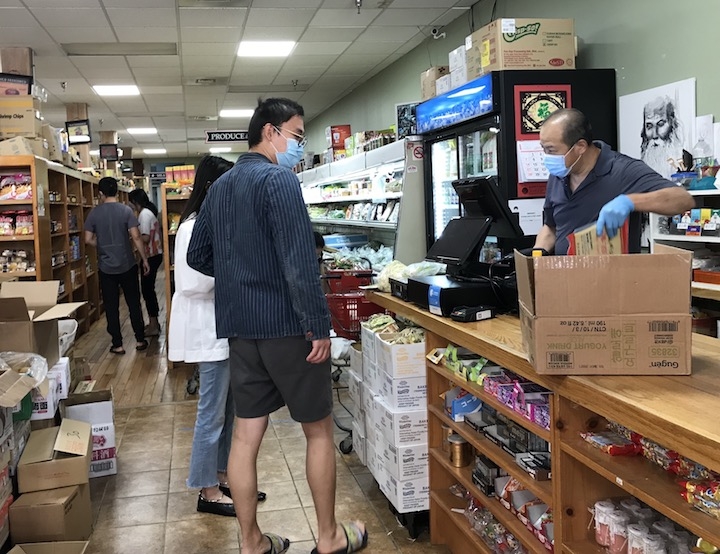
Ko Lyn Cheang photo
Zhi Yong Wang, tends to customer at Million Asian Market.
For a week now, more than a dozen customers have asked Tom Zhang when the kimchi will arrive.
A squat man with tattooed biceps, Zhang is the co-proprietor of Hong Kong Market, a popular Asian grocery store on Whitney Avenue. The pandemic has led to disruptions in food supply chains, and his kimchi supplier is taking an unusually long time to complete the delivery, affecting those who rely on the Korean staple for their daily meals.
The two-story building has played an important role in providing food for New Haven’s Asian-American immigrant community for three decades. Over the 13 years that Zhang has run Hong Kong Market, he has never had to close. But when the pandemic hit in March, Zhang worried he could not protect his and his employees’ health. He was forced to close down for one month from March 29 and April 30.
When the shutters lifted and the store reopened on May 1, customers flocked in. “They told me, ‘Thank God you guys reopened,’” Zhang said.
As small, family-owned grocery stores like this one adapt to the COVID-19 pandemic era, Asian grocers that procure harder-to-find ingredients face a unique set of challenges.
Safety Fears, Food Supply Disruptions
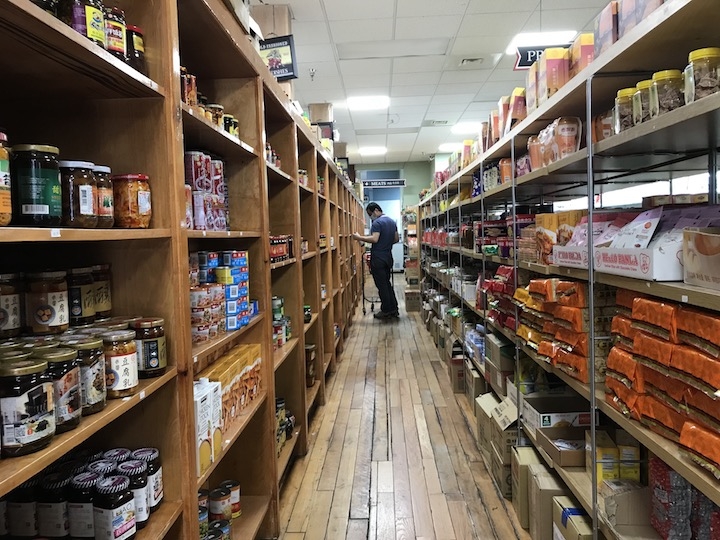
Ko Lyn Cheang photo
Shopper at Million Asian Market.
Before the pandemic, Zhang would wake up at 3 a.m. every Monday, Thursday, and Friday to drive to Queens, N.Y., to pick up fresh fruits and vegetables from his supplier, Bally Produce.
When the number of COVID-19 cases in New York City began skyrocketing in March, Zhang became worried that his own health would be at risk during these delivery trips.
“I stopped because I was worried about myself and my employees,” he said. Thus the difficult decision to close.
Since reopening, Zhang has grappled with the difficulties of running a grocery store during a pandemic. Some suppliers are no longer doing delivery; he has to pick up goods from seven or eight different suppliers himself. As a result, his work time has grown from about 40 to 60 hours a week.
But even as he talked about longer work hours, shortages of food supplies, and longer delivery times, Zhang said that there has been not much change to his life. “I don’t complain. I do what I have to do. I have to work,” he said.
He has reemployed about 90 percent of his staff. Seven workers help him stock the shelves, man the meat counter, and unload deliveries. The rest are worried about their safety and don’t want to come back to work. Sales are picking up, although they not returned to the same level as before the pandemic.
Less than a mile south of Hong Kong Market, another Asian market caters to the growing population of East Asian students, scholars, and residents in New Haven. Li Yan Xu runs Million Asian Market, also known by its Chinese name, Beijing Market, with her husband, Zhi Yong Wang at 15 Orange St.
The husband-and-wife duo said they, too, experienced shortages of imported food products during the early months of the pandemic, especially items from China, Korea, and Japan. Vinegar, soy sauce, flour, and even rice were in in short supply. Many of their special seasonal ingredients, such as lotus root and fresh bamboo shoots are not grown in the U.S and have to be imported from China. He said that this year, they have had a harder time procuring those imported products because of the pandemic.
While staple ingredients such as rice are not in shortage for the store now, certain special ingredients are less available. Japanese brands of tofu are more scarce, for example.
Zhang reported that they have also experienced longer delivery times. Before the pandemic, they would wait at most a couple of weeks for products to be delivered. Now they wait up to two months.
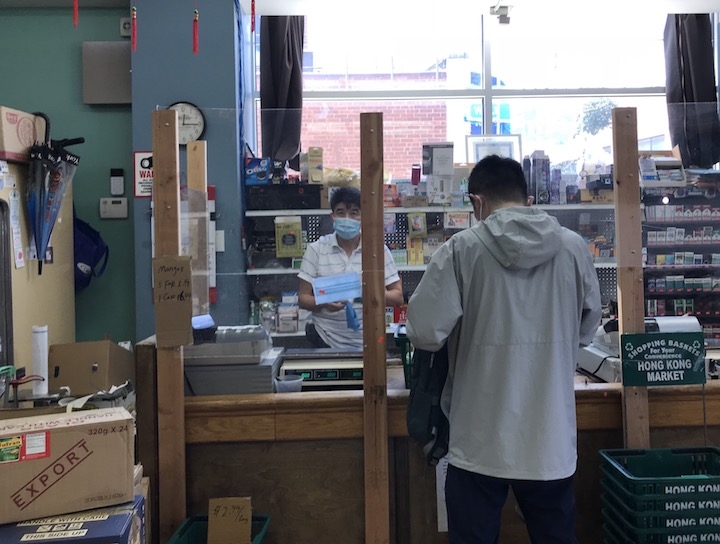
Meng Zhang, the co-owner of Hong Kong Market, helps a customer check out his items.
Food supplies have been disrupted right at the source as farms face labor shortages due to a lack of migrant seasonal workers, according to a recent report by S&P Global Market Intelligence. Without farm hands, food may rot in fields, making certain products less easily available to consumers.
Furthermore, Quantzig, an advisory firm, observed that the U.S. food supply chain has been directly affected government restrictions and safe distancing measures leading indirectly to a rise in food prices, which could cause shortages.
For now, business at Million Asian Market remains at mostly the same level as before the pandemic. As some restaurants remain closed for indoor dining and more people cook their meals at home, customers have increased their dependence on grocery stores like this one.
In order to protect themselves and their employees from exposure to the virus, Xu and Wang have shortened their store’s hours to 12-6 p.m. and reduced their trips to pick-up fresh produce in New York from three to two times a week. Xu, who doesn’t like driving beyond local roads, sends her husband and a driver to make the trips to Brooklyn and New Jersey.
Wang bleaches the van after each trip. Every night, after they close, the couple sanitize all surfaces, basket handles, and the floor. Employees are given a new set of mask and gloves each day, which they are required to wear.
When asked if they were scared of the virus, coming into contact with so many customers each day, Wang said in Chinese, “There’s no use in being scared. If we were scared, we would have closed our doors.”
A Taste Of Home
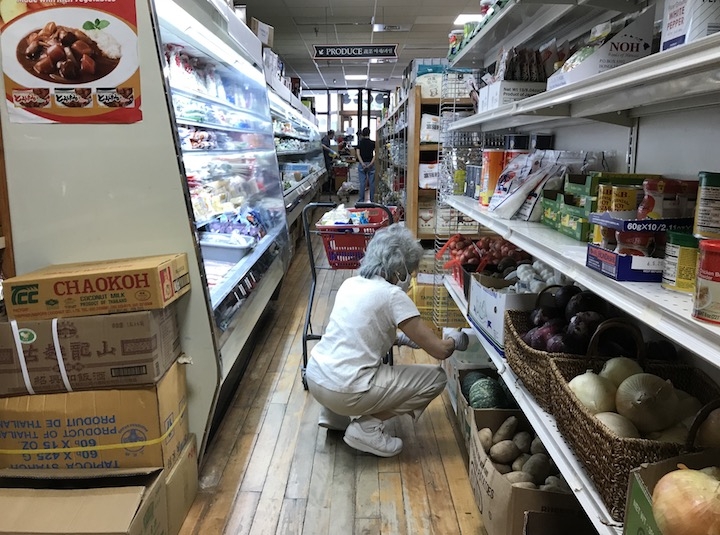
Like most grocery stores, Million Asian Market has remained open throughout the pandemic. Although Xu was worried and thought it was dangerous to remain open, she said it was necessary. “If I closed, my customers couldn’t have gotten food,” said Xu.
There is an additional reason Asian grocery stores remain open: They offer a taste of home to East Asian immigrants who are unable or unwilling to return to their countries of origin as flights are scarce during the pandemic. These two grocery stores are some of the few sources of Asian ingredients for New Haven’s 6,000-odd Asian residents.
Richard Li, a graduate student studying the violin at the Yale School of Music, depends on Hong Kong Market. “In Beijing, my mom cooks. Here, I must try to figure it out myself,” he said. Li especially enjoys the fresh peaches and salty fermented bean paste that he can find at the market, which he visits twice a week. The familiar ingredients remind him of home.
The neat wooden shelves of Million Asian Market are filled with ingredients that are rare in most American chain supermarkets. Hairy stalks of fresh yam, prickly purple dragonfruit, and leathery rounds of lychee sit in cardboard crates. Bags of every variety of rice are available here: short grain rice, long grain rice, Japanese rice, black rice, and purple rice.
“[This store] makes me feel some taste of home,” said Wan Bo Wang, a graduate student at the Yale School of Art who is from Beijing. Wang appreciates how the items at Million Asian Market are cheaper than at the upscale grocer, Elm City Market, just two blocks away. Baby bok choy, lotus root, sesame oil and soy sauce are some of the ingredients on Wang’s regular shopping list.
When he first took over Hong Kong Market from his uncle in 2008, the store had about five hundred products. Now, the market, which Zhang runs with his business partner, has 3,000 to 5,000 items. Many were ordered at the special request of customers.
A few days ago, a customer brought the empty packaging for a specific brand of beancurd and celery dumplings to the store. “If possible, can you order this?” they asked. Zhang identified the producer as one from whom he already orders items like shrimp and leek dumplings. He immediately contacted the supplier to place an order.
Asian grocery stores like Hong Kong Market also play an important role in New Haven’s Asian food ecosystem: Zhang helps chefs, restaurant owners, and food lovers procure ingredients. One of the regular patrons at Hong Kong Market is Coreen Guo, the owner of Ivy Wok, the cosy Chinese restaurant on Broadway. She visited the store on Wednesday to buy a bundle of lemongrass and a packet of candies.
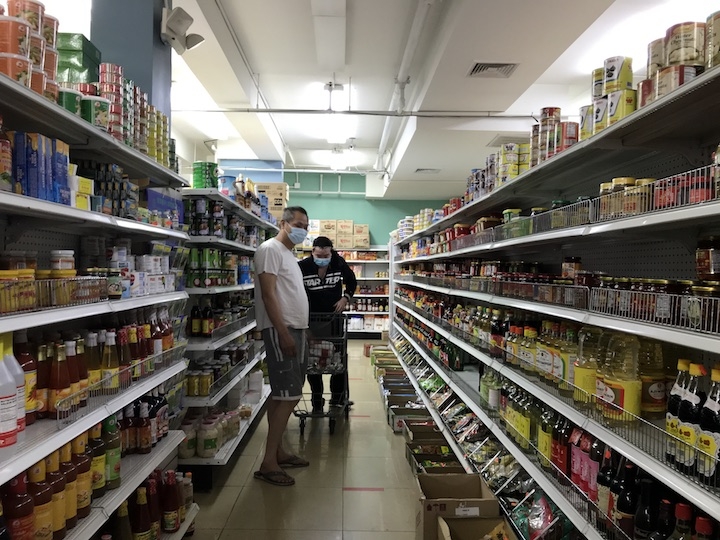
Shoppers at Hong Kong Market.
“Most of the [local Asian restaurants] get some ingredients from here,” said Zhang, explaining that they have ingredients that are hard to find in Connecticut, such as Thai basil and lemongrass. Some restaurants ask him to order special ingredients like fish sauce or big sheets of fresh, fat hor fun noodles, which he procures, piping hot and freshly-steamed, from New York in the early morning.
There was a long queue of at least eight customers Wednesday afternoon at the store. “Tomorrow is ‘zongzijie’,” Xu explained, referring to the Dragon Boat Festival, a traditional holiday celebrated by the Chinese people worldwide during which sticky rice dumplings are wrapped, cooked, and eaten with family. Customers were buying ingredients to make dumplings. Xu recommends the pre-made sticky rice meat dumplings to a customer. Standing in the aisle of his crowded store, Wang said through a blue face mask, “Everyone must continue their lives. Supermarkets must open.”